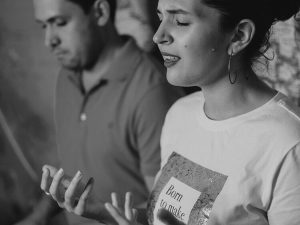
Virtual Choir Singing
Exploration of the feasibility of virtual choir singing using low-latency technology

Exploration of the feasibility of virtual choir singing using low-latency technology

A Global survey exploring as a culturally and socially important activity for individuals who stutter
Every year, SingWell’s Executive Committee selects research study proposals brought forth by our partners to receive funding to further the project’s research objectives.
SingWell’s annual call for proposals is exclusively for our research partners. Interested in becoming a SingWell partner?
Click here to learn more about the different project memberships we offer!
Researchers: Gemma Perry and Dr. Bill Thompson, Macquarie University (Australia)
Breathing disorders lead to psychological (anxiety, depression), physiological (posture, nervous system dysfunction), and communication problems (voice production), and may result in social isolation and loneliness. This project will assess the benefits of a 12-week online chanting program for individuals with breathing disorders.
Group chanting is a repetitive, rhythmic vocalization that requires controlled breathing and vocal synchronization with co-participants. It is a ubiquitous practice found in many traditions worldwide and is used to strengthen communities and nurture health and wellbeing.
Our research has already demonstrated that group chanting can reduce stress, increase social connectedness, and induce altered states of consciousness and feelings of wellbeing. This investigation will assess these outcomes, while also evaluating therapeutic benefits for breathing and communication function. The research will lead to an understanding of the therapeutic potential of group chanting, and the development of new chanting programs designed to help individuals with breathing and communication disorders.
Researchers: Drs. Louise Drouin and Nicole Marquis, Université de Sherbrooke (Canada)
Using a mixed-method non-inferiority design, with a non-probability convenience sampling, we propose a group singing online program as a complement or alternative to online pulmonary rehabilitation (OPR), for older adults with respiratory disease. Due to restrictions on social gatherings as a result of the pandemic, as well as geographic and weather conditions limiting the mobility of people affected by airflow limitation, our study aims to improve the wellbeing of potential participants. This 12-week study is based on our recent pilot comparing the effects of pulmonary rehabilitation (PR) and group singing programs (GS) on lung function, quality of life, cognition, and satisfaction (1). We plan to replicate the program online, on a weekly basis, with an adaptable hybrid format, accepting a few in-person participants dependent on restrictions and individual preferences. We will also measure communication abilities, including speech and singing voice variables as well as social inclusion.
Researcher: Dr. Jessica Richardson, University of New Mexico (U.S.A.)
Persons with acquired communication disorders (CDs) experience sudden or insidious onset of communication challenges that dramatically change their ability to participate in everyday life activities. This often results in social isolation, which in turn can lead to onset or worsening of depression, worsening of communication deficits, and even introduction of cognitive deficits. To improve outcomes of persons with CDs, accessible and affordable interventions that combat isolation and encourage communication and life participation are needed. We will generate knowledge about the effects of a group singing intervention on communication and social wellbeing outcomes for persons with aphasia and for persons with Parkinson disease. There are approximately 2.6 million people in North America living with aphasia1 and over 1 million people in North America living with Parkinson disease2,3 who will benefit from this knowledge and have renewed hope for reducing disability burden and improving life participation.
Researcher: Dr. Annabel J. Cohen, University of Prince Edward Island (Canada)
Treble Tremors, a longtime singing group for persons in PEI with Parkinson’s Disease, began meeting online in 2020 due to the pandemic. In 2020, a pilot project was conducted by UPEI student Emma Campbell, demonstrating the feasibility of conducting singing and speaking tests online. The present proposal aims to extend this approach with volunteers from the Treble Tremors. A new weekly PD music interest group will also be formed where participants listen to music and discuss memories, but do not sing. A variety of tests will be administered to both groups, aiming to show benefits to the voice and well-being for the weekly singing group. Showing benefits of online rehearsals may open doors to those who otherwise may be unable to participate. The study may reveal benefits of online PD choirs, online vocal data collection, and the value of data on singing as a marker of resilience to PD progression.
Researchers: Drs. Dawn Merrett and Isabelle Peretz, Université de Montréal (Canada)
The primary aim of this research is to evaluate the role of group bonding in the health and well-being benefits attributed to group singing. We will assess the impact of four weekly singing sessions on mood, feelings of connectedness, cortisol (a stress hormone), heart rate variability, and synchrony in three different groups: (1) singing alone, (2) singing in a group that is different every week, or (3) singing in a group that is the same every week. This will allow us to investigate the effects of “group singing” versus “group bonding” and to answer some important questions, including: How do singing effects on mood and well-being evolve over time? Is singing in a group that is unfamiliar still better than singing alone? Does a choir need to “bond” to effectively improve mood and well-being? Do singers synchronize better with familiar individuals and does synchrony correlate with feelings of connectedness? Answers to these questions will help improve the design of singing interventions.
Researcher: Dr. Simone Falk, University of Montréal (Canada)
Stuttering is a speech fluency disorder which impedes communication. Due to the stigma surrounding this
communication disorder, people who stutter often suffer from reduced psychosocial wellbeing, frequently
characterized by anxiety, guilt, shame, and isolation. Group singing is a way to heighten social connectedness in
addition to psychological wellbeing, and has the potential to enhance inclusion of rather isolated minorities.
Therefore, we aim to study the effects of choir singing on communication and on psychosocial wellbeing in
children and adults who stutter. In a first of a kind pilot study, two choirs (an adult and a children’s choir) will be
run for 10 weeks to evaluate effects of singing on articulation, well-being, and socio-emotional aspects specific
to stuttering. This study will allow us to evaluate how singing can impact this complex communication disorder
and present the potential for individuals of different age groups (children vs adults).
Researcher: Dr. Isabelle Peretz, University of Montréal (Canada)
New immigrants who do not speak the language of their adopted community face the challenging tasks of learning the language while also integrating into an unfamiliar society. The available research on group singing suggests that it would be an ideal option to tackle issues around communication, integration, and well-being for new immigrants, but to date there is no quantitative evidence for its value in this population. This proof-of-concept study is preparation for a randomized controlled trial that can determine whether choir is an efficient and effective strategy to promote language learning and integration. Using choir workshops that have been added to the program of a government-subsidized language center, we will assess the suitability of our proposed measures of language proficiency, integration, and well-being and will obtain quantitative and qualitative data from both new immigrants and language center staff about potential obstacles to and facilitators of choir participation, so that choirs for new immigrants can be implemented in the most appropriate manner.
Researcher: Rena Sharon, University of British Columbia (Canada)
This project proposes to contribute to SingWell’s research on Virtual Group-Singing modalities through a study of a multi-modal virtual group-singing course, “Musical Movements,” offered by the BC Brain Wellness Program at UBC’s Djavad Mowafaghian Centre for Brain Health. The course comprises group-singing, movement, musical knowledge acquisition, and supportive interaction. Encompassing a multi-strand participant population, its specialized content design centers around individuals living with Parkinson’s and other neurological conditions, and welcomes care partners as well as participants of BCBWP’s “healthy aging” activities. While standard virtual technology allows those with isolation or other access challenges to participate in arts-based collective activities, high-latency audio lag precludes synchronous singing and auditory collectivity. Through a mixed-method range of research we seek to chronicle the transition to low-latency synchronous singing for this diverse group, and the experiential impact to arts-based expression, social connectedness, and wellness.
Ⓒ 2020-2024, The SingWell Project